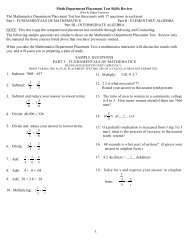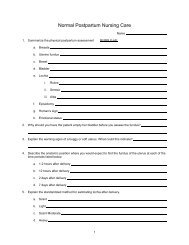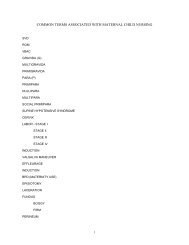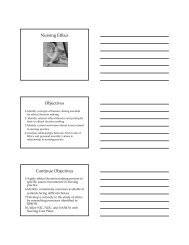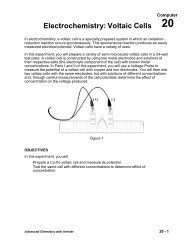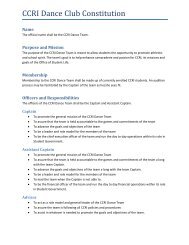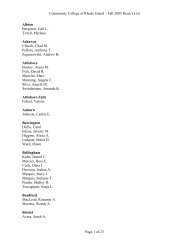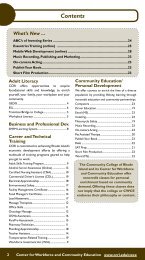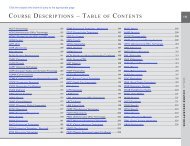Course Descriptions - Community College of Rhode Island
Course Descriptions - Community College of Rhode Island
Course Descriptions - Community College of Rhode Island
Create successful ePaper yourself
Turn your PDF publications into a flip-book with our unique Google optimized e-Paper software.
communicate more effectively with diverse<br />
populations, to foster inclusive attitudes in<br />
the classroom and to work more effectively<br />
toward the elimination <strong>of</strong> racism and other<br />
forms <strong>of</strong> discrimination in public education<br />
and social service delivery systems. A 12-<br />
hour practicum is required to meet the<br />
artifact requirement for education majors<br />
planning to transfer. (Corequisite: HMNS<br />
2060 or 2070 or permission <strong>of</strong> instructor)<br />
Lecture: 3 hours<br />
HMNS 2900 - Human Services<br />
Capstone - 3 Credits<br />
The Human Services Capstone course integrates<br />
student’s comprehensive knowledge<br />
gained through the learning experiences<br />
involved in pursuit <strong>of</strong> the Human Services<br />
program curriculum. Students draw upon<br />
knowledge and skill gained in Human Services<br />
and general education requirements<br />
to prepare comprehensive and integrated<br />
solutions to case study problems presented<br />
in class. A large part <strong>of</strong> learning will come<br />
from students’ small group work, taking<br />
advantage <strong>of</strong> each other’s collective knowledge<br />
and skill, integrating both educational<br />
and social services curricula. (Prerequisite:<br />
Final semester standing) Lecture: 3 hours<br />
hSTo (hiSToTeChniCiAn)<br />
HSTO 1310- Introduction to Histology -<br />
3 Credits<br />
Students are introduced to the procedures<br />
involved in the initial accessioning, evaluation,<br />
processing and slide preparation <strong>of</strong><br />
various surgical and autopsy specimens.<br />
Additional topics such as safety/infection<br />
control, instrumentation and laboratory<br />
mathematics are included. (Prerequisite:<br />
Enrollment in Histotechnology program) Lecture:<br />
3 hours<br />
HSTO 1320 - Histology II - 6 Credits<br />
This course provides practical application<br />
<strong>of</strong> principles and techniques <strong>of</strong> histological<br />
practices. The clinical setting provides the<br />
realistic conditions under which a histotechnician<br />
functions and allows students to<br />
refine and build upon knowledge from the<br />
Introduction to Histology course. Students<br />
are introduced to the procedures involved<br />
in the processing, embedding, cutting and<br />
evaluation <strong>of</strong> various surgical and autopsy<br />
specimens. Students also experience basic<br />
histology equipment use and maintenance<br />
along with quality control measures. (Prerequisite:<br />
HSTO 1310) Lecture: 3 hours, Clinical:<br />
8 hours per week<br />
HSTO 2310 - Histology III - 9 Credits<br />
This course provides practical application<br />
<strong>of</strong> principles and techniques <strong>of</strong> histological<br />
practice. The clinical setting provides<br />
realistic conditions under which a histotechnician<br />
functions and allows students to<br />
refine those skills acquired in Histology II.<br />
Students are introduced to the procedures<br />
involved in the embedding, cutting H&E<br />
staining and evaluation <strong>of</strong> various surgical<br />
and autopsy specimens. Students also will<br />
experience special stains for various tissue<br />
components including minerals, pigments,<br />
connective tissues, amyloid and carbohydrates.<br />
(Prerequisite: HSTO 1320) Lecture: 3<br />
hours, Clinical: 16 hours per week<br />
HSTO 2320 - Histology IV - 12 Credits<br />
This course provides practical application<br />
<strong>of</strong> principles and techniques <strong>of</strong> advanced<br />
histological procedures. The clinical setting<br />
provides realistic conditions under<br />
which a histotechnician functions and<br />
allows students to refine skills acquired<br />
in Histology III. Students will refine skills<br />
in embedding, cutting tissue sections, H&E<br />
staining and evaluation <strong>of</strong> various surgical<br />
and autopsy specimens. Students experience<br />
special stains for microorganisms and<br />
neuropathology. Students are introduced<br />
to the special procedures such as immunohistochemistry,<br />
enzyme histochemistry and<br />
electron microscopy. (Prerequisite: HSTO<br />
2310) Clinical: 32 hours per week<br />
HSTO 2330 - Histology Seminar -<br />
2 Credits<br />
This course provides students with an<br />
extensive review, as well as assistance in<br />
the preparation <strong>of</strong> a portfolio. Guest lecturers<br />
discuss advanced topics in histology<br />
and pr<strong>of</strong>essional issues. (Corequisite:<br />
HSTO 2320) Lecture: 2 hours<br />
inST (proCeSS ConTrol<br />
TeChnology)<br />
INST 1010 - Introduction to<br />
Instrumentation Technology - 3 Credits<br />
This course stresses the theory and practical<br />
application <strong>of</strong> mechanical and electrical<br />
sensing devices and control systems. Topics<br />
covered include sensing and control<br />
devices for temperature, humidity, pressure,<br />
level and flow. In addition, calibration<br />
procedures are covered. Lecture: 2 hours,<br />
Lab: 2 hours<br />
INST 1020 - Basic Hydraulic and<br />
Pneumatic Components - 3 Credits<br />
This course covers the principles and<br />
operation <strong>of</strong> basic hydraulic and pneumatic<br />
components and circuits. Emphasis<br />
is placed on system maintenance and<br />
repair. Lecture: 2 hours, Lab: 2 hours<br />
INST 1030 - Introduction to Industrial<br />
Wastewater Treatment and Pollution<br />
Prevention - 3 Credits<br />
This course introduces students to the<br />
fundamentals <strong>of</strong> industrial wastewater<br />
treatment and pollution prevention.<br />
Students become familiar with state-<strong>of</strong>the-art<br />
wastewater recycling equipment,<br />
proper waste management techniques and<br />
practices and applicable federal, state and<br />
local environmental rules and regulations.<br />
Lecture: 2 hours, Lab: 1 hour<br />
Prerequisite: Successful completion <strong>of</strong> course required before registering. Corequisite: <strong>Course</strong> must be taken prior to or at the same time.<br />
hmns-hsto-inst<br />
INST 1110 - Instrumentation I -<br />
5 Credits<br />
This course introduces the study <strong>of</strong> typical<br />
transducers and instruments used for the<br />
measurement <strong>of</strong> pressure, temperature<br />
and liquid level. In addition, calibration<br />
procedures are covered. Stress is placed<br />
on mechanical means <strong>of</strong> measurement and<br />
electrical sensing devices during each unit.<br />
This course emphasizes the underlying<br />
principles <strong>of</strong> design and operation <strong>of</strong> industrial<br />
measuring devices. Lecture: 3 hours, Lab:<br />
4 hours<br />
INST 1210 - Instrumentation II -<br />
5 Credits<br />
A continuation <strong>of</strong> Instrumentation I, this<br />
course explores transducers and instruments<br />
used for the measurement <strong>of</strong> gas<br />
and liquid flow, humidity, specific gravity,<br />
viscosity and chemical analysis. Also considered<br />
are the principles and methods<br />
<strong>of</strong> transmission, both pneumatic and electronic.<br />
(Prerequisite: INST 1110 or permission<br />
<strong>of</strong> instructor) Lecture: 3 hours, Lab: 4 hours<br />
INST 2310 - Control Principles -<br />
5 Credits<br />
This course focuses on the application <strong>of</strong><br />
control techniques to the industrial process.<br />
Included are the study <strong>of</strong> electronic<br />
and pneumatic controllers, control valves,<br />
time constants, frequency response, closed<br />
and open loops and feedback control systems.<br />
Advanced control techniques such as<br />
cascade, feed forward and adaptive control<br />
are discussed. Laboratory experiments<br />
focus on modes <strong>of</strong> control, process dynamics<br />
and controller tuning. (Prerequisite: INST<br />
1210 or permission <strong>of</strong> instructor) Lecture: 3<br />
hours, Lab: 4 hours<br />
INST 2320 - Introduction to Programmable<br />
Logic Controllers - 3 Credits<br />
This course presents a theoretical and<br />
practical knowledge <strong>of</strong> the relatively low<br />
cost, very utilitarian member <strong>of</strong> the microprocessor<br />
family called the Programmable<br />
181



